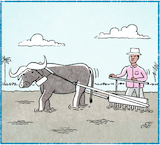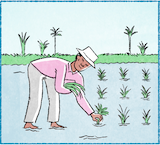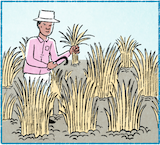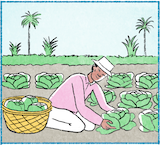



นี้คือสัดอี่หยัง อันนี้เป็นควย เขาเอิ้นว่าควย
โตของควยมันโตใหญ่ แล้วควยมันมีแฮงหลายพ้อม
ตอนนี้เขาเฮ็ดอี่หยังกับควย เขาใซ้ควยไถนา เขากำลังเอาควยมาไถนาอยู่
สะหมัยแต่กี้ หลือสะหมัยก่อนบ่มีลดไถนา หลือว่าบ่มีลดไถ เขาต้องใซ้ควย เอาควยมาไถนา เพื่อที่สิเอาไว้ถ้าเฮ็ดนาหลือปูกเข้านั้นหละ
แล้วตอนนี้เขาเฮ็ดอยู่ใส เขาอาดสิเฮ็ดอยู่ทุ่งนาของเขา หลือว่าไฮ่นาของเขากะได้ เขากะเลยมาไถนาอยู่หม้องนี้
2
เขากำลังเฮ็ดหญัง เขากำลังดำนา
เขากำลังเฮ็ดนา หลือว่ากำลังปูกเข้านั้นหละ
แล้วเขาเฮ็ดอยู่ใสตอนนี้ กะเฮ็ดอยู่ทุ่งนา หลือว่าไฮ่นาของเขานั้นหละ
เขากำลังปูกเข้า กำลังดำนา เฮ็ดอยู่นาของเขา
แล้วพุซายคนนี้เขาเฮ็ดท่าทางจั่งใด เขากำลังก้มโค้งอยู่ เขากำลังเฮ็ดนา เขากำลังดำนา
เขาใซ้มือข้างหนึ่ง หลือว่าข้างขวาของเขานั้นหละ จับมัดก้าอยู่
มัดก้ากะสิมัดใหญ่ๆ หลือว่ามัดก้านั้นสิมีเข้าหลายต้น
แล้วเขากะใซ้มืออีกข้างหนึ่ง หลือว่ามือข้างซ้ายนั้นหละ แล้วแต่คนถะหนัดสิจับฝั่งใด หลือญกฝั่งใดกะได้
แต่ว่าพุซายคนนี้ เขาใซ้มือข้างซ้ายของเขา ดึงต้นก้าที่อยู่ในมัดก้านั้น แล้วดึงออกมาจักหน่อยหนึ่ง หลือว่าสี่ห้าต้น แล้วกะมาเสียบลงดิน เพื่อที่สิปูกเข้า เพื่อที่สิปูกเข้าลงไปในดิน หลือว่าเสียบต้นเข้าลงไปในดิน เพื่อที่สิให้มันต้นใหญ่ๆ ขึ้นไป
3
เขากำลังเฮ็ดหญัง เขากำลังเกี่ยวเข้า
พุซายคนนี้เขากำลังเกี่ยวเข้าอยู่
เขากำลังเกี่ยวเข้าอยู่ใส เขากะอาดสิเกี่ยวอยู่ในไฮ่นาของเขา หลือว่าไฮ่เข้าของเขา
เข้ามันต้นใหญ่แล้ว หลือว่าเข้ามันแก่แล้ว เขากะเลยมาเกี่ยวเข้าอยู่ในนาเข้าของเขา เพื่อที่สิเอาเข้านี้ไปกิน
แล้วเขาใซ้อี่หยังมาเกี่ยวเข้า เขากะใซ้เกี่ยว เขาเอิ้นว่าเกี่ยว คนอี่สานกะเอิ้นว่าเกี่ยว
เกี่ยวกะสิเป็นค้ายๆ กับมีด มีคมคือกันกับมีด แต่ว่าลักสะนะของเกี่ยวมันสิเป็นงอๆ เป็นงอๆ เข้าเพื่อที่สิได้เกี่ยวเข้ามาได้ หลือว่าดึงเข้ามาได้นั้นหละ
4
เขากำลังเฮ็ดหญัง เขากำลังเก็บผัก เขากำลังเก็บผักอยู่ในสวนอยู่
เขากำลังเก็บผักอี่หยัง เขากำลังเก็บผักกะหล้ำ
อันนี้เขาเอิ้นว่าผักกะหล้ำ หลือว่ากะหล้ำปีนั้นหละ
แต่ว่าคำว่า กะหล้ำปี มันญาวโพด คนอี่สานเขากะเลยมักเอิ้น กะหล้ำ ซื่อๆ ผักกะหล้ำ
เขาเก็บผักแล้ว เขาเอาผักไปไว้ใส หลือเอาไว้หม้องใด เขาเอาผักไว้ในเข้ง หลือว่าเอาไว้ในกะต่า
แล้วพุซายคนนี้ เขาเฮ็ดท่าทางจั่งใด เขากำลังนั่ง เขากำลังนั่งพับเพียบอยู่ กำลังนั่งเก็บผัก
ใซ้มือสองข้างดึงผักขึ้นมา แล้ว[เอา]มาใส่ในเข้ง หลือว่ากะต่า
Link to overview page
Link to dictionary
| Isaan | Pronunciation | Tones | Thai | English/Notes |
|---|---|---|---|---|
| นี้ | ni: | HF | นี้ | 1. this 2. here |
| คือ | khʉ: | HR | คือ | 1. to be, to resemble, like, as 2. why {บักหล้าคือบ่เก็บโต่ะแน่ = [addressing a young boy] Why haven't you cleared the table?} |
| สัด | sat | M | สัตว์ | animal |
| อี่หยัง | i:-yaŋ | H-M | อะไร | 1. what {นี้คืออี่หยัง = What is this?} {มื้อนี้เจ้าเฮ็ดอี่หยัง = What are you doing today?} {กินเข้างายกับอี่หยัง = What did you have for breakfast?} 2. something, anything, (in negations) nothing {บ่ต้องเฮ็ดอี่หยังอีกเลยนอกจากใส่ปุย = [we] don't need to do anything besides adding fertilizer} |
| อัน | an | M | อัน | 1. thing, object 2. general clf. for objects |
| เป็น | pen | M | เป็น | 1. to be, to exist 2. to be able to 3. to suffer, sth. happens to 4. เป็นหญัง[...]คือ in initial position: why? {เป็นหญังเขากะคือแปงฟัน = Why is he brushing his teeth?} {เป็นหญังเคี่ยงบินมันคือสิตก = Why is the airplane falling down?} |
| ควย | khu:ai | HR | ควาย | water buffalo |
| เขา | khao | M | เขา | personal pronoun: he, she |
| เอิ้น | ə:n | HF | พูด, เรียก | to call, to say {เอิ้นง่ายๆ ว่า = in other words} {คนอี่สานเอิ้นว่า เป็นลูกคนกก = Isaan people call her ลูกคนกก} |
| ว่า | wa: | H | ว่า | 1. that, as {คำว่า X = the word X} 2. to say |
| โต | to: | M | ตัว | 1. body, self 2. clf. for animals, characters/letters/consonants, appliances, clothes (e.g., pairs of trousers, shirts) |
| ของ | khɔ:ŋ | M | ของ | of, belonging to |
| มัน | man | HR | มัน | it (also used to refer to people) |
| ใหญ่ | ɲai | H | ใหญ่ | large, big |
| แล้ว | lɛ:o | HF | แล้ว | 1. finished 2. already 3. and then, and next (especially แล้วกะ) 4. auxiliary for past tense |
| มี | mi: | HR | มี | 1. to have 2. there is |
| แฮง | hɛ:ŋ | HR | แรง | 1. strong {ลมกำลังพัดแฮงอยู่ = to wind is blowing strongly} 2. loud {เสียงแฮง = loud} 3. strength, power |
| หลาย | la:i | M | เยอะ, มาก | many, much, very |
| พ้อม | phɔ:m | HF | พร้อม | at the same time, also, too {มีตะเว็นพ้อม = the sun's out, too} {กะทะมีด้ามพ้อม = the pan has also a handle} |
| ตอนนี้ | tɔ:n-ni: | M-HF | ตอนนี้ | now |
| เฮ็ด | het | H | ทำ | to do, to make |
| กับ | gap | M | กับ | 1. and {ลุงกับป้า = uncle and aunt} {กวยเตียวหมูกับกวยเตียวไก่ = noodle soup with pork and noodle soup with chicken} 2. with, to {ค้ายๆ กับคำว่า ... = similar to the word ...} 3. prefix in front of foods {กับเข้า = side dishes eaten with rice} {เขากินกับกวยเตียว = he's eating noodle soup} |
| ใซ้ | sai | HF | ใช้ | to use |
| ไถ | thai | M | ไถ | to plough {ไถนา = to plough the field} |
| นา | na: | HR | นา | rice field |
| กำลัง | gam-laŋ | M-HR | กำลัง | auxiliary indicating continuous or progressive action |
| เอา | ao | M | เอา | to take, to give {เขากำลังเอาก่องไปซั่ง = he's taking the boxes to weigh them} {หมอกำลังเอายาให้คนป่วยกิน = the doctor is giving medicine to the patient} {เอาไว้ถ้า = is for, is used for, has the purpose of} |
| มา | ma: | HR | มา | 1. to come 2. auxiliary expressing action towards the present or focal time {กะคุเฮ็ดมาจากอี่หยัง = What is the bucket made of?} {แล้วเขากะเก็บเงินจากพุนั้นมา = and then she takes the money of that person} |
| อยู่ | yu: | H | อยู่ | 1. to be (located) at 2. yet, still 3. auxiliary indicating continuous or progressive action {ทอดปาอยู่ในกะทะ = (in the process of) frying a fish in the pan} {แม่กำลังเมี้ยนเฮียนอยู่ = mother is cleaning/tidying up the house} |
| สะหมัย | sa-mai | M-M | สมัย | time, period, age, epoch |
| แต่กี้ | tɛ:-gi: | H-HF | previous, former {สะหมัยแต่กี้เด็กน้อย = when/at the time [I] was a young child} | |
| หลือ | lʉ: | M | หรือ | or |
| ก่อน | gɔ:n | H | ก่อน | 1. before 2. first, first of all |
| บ่ | bɔ: | H | ไม่ | 1. no, not 2. question particle, transforming a statement into a question Notes: spelling exception in line with common usage on social media |
| ลดไถ | lot-thai | H-M | รถไถ | tractor with a plough, engine-powered plough |
| ต้อง | tɔŋ | HF | ต้อง | to have to, must |
| เพื่อที่ | phʉ:a-thi: | H-H | เพื่อที่ | in order to, so that Notes: the vowel เอือ is likely to be a Thai loan |
| สิ | si | M | จะ | future tense auxiliary {เขากำลังสิตื่น = he's about to wake up} {สิไปตะหลาด = [I'm] going to the market} |
| ไว้ถ้า | wai-tha: | HF-LF | usually in a positive statement or answer: is for, is used for, has the purpose of {กะทะมีไว้ถ้าทอด = a pan is for frying} {น้ำบักนาวมีไว้ถ้าปุงอาหาน = lime juice is used to season food} {ปากกามีไว้ถ้าเขียน = a pen is for writing} {กะเทียมเอาไว้ถ้าเฮ็ดแนวกิน = garlic is used to make food} {ขาเอาไว้ถ้าญ่าง = legs are for walking} {เกิบเอาไว้ถ้าใส่ = shoes are for wearing} Notes: see also ไว้ |
|
| เฮ็ดนา | het-na: | H-HR | ทำนา | to farm, to do rice-farming |
| ปูก | pu:k | LF | ปลูก | to grow, to plant {ปูกเข้า = to grow/plant rice} {ปูกผัก = to grow vegetables} |
| เข้า | khao | LF | ข้าว | rice {กินเข้า = to eat} {ปูกเข้า, เฮ็ดเข้า = to grow/plant rice} {เกี่ยวเข้า = to harvest rice} {กับเข้า = courses eaten with rice} |
| นั้นหละ | nan-la | HF-M | นั่นแหละ | auxiliary for emphasis at the end of a phrase |
| ใส | sai | M | (ที่)ไหน | 1. where? {สิไปใส = Where are [you] going?} {มาแต่ใส = Where are [you] coming from?} {กะทะอยู่ใส = Where's the pan?} 2. somewhere, anywhere {ใสกะได้ = anywhere, wherever you like} |
| อาด | a:t | LF | อาจ | 1. might, may, will 2. likely |
| ทุ่ง | thuŋ | H | ทุ่ง | field, pasture {ทุ่งนา = rice field} |
| ไฮ่ | hai | H | ไร่ | plantation, field (for crops other than cereal) {ไฮ่นา = general term for fields, including rice fields} |
| กะ | ga | M | ก็ | 1. then, consequently 2. also |
| ได้ | dai | HF | ได้ | 1. can 2. to get, to obtain 3. before verb: indicating past tense 4. บ่ได้ + verb: not |
| เลย | lə:i | HR | เลย | 1. futher on, beyond, past {เข็มน้อยเลยเลขสิบสองไป = the minute hand has passed number twelve} 2. too much 3. at all 4. definitively 5. completely, utterly |
| หม้อง | mɔŋ | LF | ที่, แห่ง, บริเวณ | 1. place, area {หลายที่หลายหม้อง = in many places} {หม้องใดหม้องหนึ่ง = some place} 2. clf. for places |
| หญัง | ɲaŋ | M | อะไร, เป็นหญัง = ทำไม | 1. what {เขากำลังเฮ็ดหญัง = What is he doing?} {ธูปเอาไว้เฮ็ดหญัง = What are incense sticks for?} 2. something, anything, (nothing) 3. เป็นหญัง[...]คือ in initial position: why {เป็นหญังเขาคือใส่บักพิกลงไปในกวยเตียว = Why is he putting chili in [his] noodle soup?} {เป็นหญังหน้าต่างมันคือเปิด = Why is the window open?} {เป็นหญังมันคือมีควนไฟ = Why is there smoke?} |
| ดำนา | dam-na: | M-HR | ดำนา | to transplant rice seedlings |
| พุซาย | phu-sa:i | H-HR | ผู้ชาย | man, male |
| คน | khon | HR | คน | person, people |
| ท่าทาง | tha:-tha:ŋ | H-HR | ท่าทาง | 1. expression, look, manner 2. gesture 3. posture, appearance |
| จั่งใด | jaŋ-dai | H-M | ยังไง, แบบไหน | how, in what manner {บักนาวมันมีลดซาดจั่งใด = Lime fruits have what kind of taste?} {เขาปิดแอจั่งใด = How is he switching off the A/C?} {เทียนใซ้จั่งใด = How's a candle used?} {สิใซ้จั่งใด = how is [it] used?} |
| ก้ม | gom | HF | ก้ม | to bend down, to stoop |
| โค้ง | kho:ŋ | HF | โค้ง | 1. curved, bent 2. curve |
| มือ | mʉ: | HR | มือ | 1. hand 2. front leg/paw (e.g., of a cat) |
| ข้าง | kha:ŋ | LF | ข้าง | 1. side {มีหูจับสองข้าง = there are handles on both sides} 2. next to {วางอยู่ข้างๆ ก่องใบใหญ่ = it's placed next to the large box} {เขายืนอยู่ข้างๆ อีกพุหนึ่ง = he's standing next to another person} 3. clf. for body parts which come in pairs (eyes, ears, legs etc.) {เขามีตาสองข้าง = she has two eyes} |
| หนึ่ง | nʉŋ | H | หนึ่ง | 1. one 2. after adjective: intensifier {บักคักหนึ่ง = very much} {อันบักใหญ่หนึ่ง = very large}, or attenuates the meaning {กะดาดมันแผ่นน้อยๆ หนึ่ง = the piece of paper is [relatively] small} |
| ข้างขวา | kha:ŋ-kwa: | LF-M | ข้างขวา | right, (on the) right side |
| จับ | jap | M | จับ | 1. to grasp, to hold {เขาจับมือกัน = they're holding hands} {เขายืนจับไอติมอยู่ = she's standing, holding an ice cream} 2. to catch, to arrest {จับพุล้าย = to arrest a criminal} |
| มัด | mat | H | มัด | 1. to bind, to tie, to fasten, to wrap 2. clf. for bundles, bunches {มัดก้า = bundle of rice seedlings} |
| ก้า | ga: | HF | กล้า | seedling, rice seedling |
| นั้น | nan | HF | นั้น | that, there |
| ต้น | ton | HF | ต้น | 1. clf. for trees, plants, logs/pieces of wood {ต้นไม้ต้นใหญ่ = a large tree} {ต้นฟืน = log/piece of wood} 2. first, primary, initial {ลูกคนต้นหมู่ = first child} |
| อีก | i:k | LF | อีก | 1. more, again 2. other, another |
| ข้างซ้าย | kha:ŋ-sa:i | LF-HF | ข้างซ้าย | left, (on the) left side |
| แล้วแต่ | lɛ:o-tɛ: | HF-H | แล้วแต่ | up to, depending on |
| ถะหนัด | tha-nat | M-M | ถนัด | 1. to be expert in/at, to be skilled in/at, to be strong in 2. to be dexterous |
| ฝั่ง | faŋ | H | ฝั่ง | 1. side 2. river/canal bank, shore |
| ใด | dai | M | ใด | 1. which, that one which, what, how {เขานั่งแบบใด เขานั่งขดตะหมาดอยู่ = How is he sitting? He's sitting cross-legged.} {ตอนใด = when?} 2. whichever, whoever {หม้องใดหม้องหนึ่ง = some place, somewhere} {ขั้นเฮาอยากตื่นญามใด เฮากะตั้งเวลาปุกญามนั้น = If we want to get up at a certain time, we set the alarm to that time} Notes: sentence-final often with a marked rising tone |
| ญก | ɲok | H | ยก | 1. to raise {ญกมือขึ้น = to raise the hand} {ญกโตอย่าง = to give an example} 2. to lift {เขากำลังญกก้อนหินขึ้น = he's lifting up the stone} |
| แต่ว่า | tɛ:-wa: | H-H | แต่ว่า | 1. but 2. only {ฮู้แต่ว่าเขายืนอยู่พุเดียว = I only know that he's standing there by himself} |
| ดึง | dʉŋ | M | ดึง | to pull |
| ต้นก้า | ton-ga: | HF-HF | ต้นกล้า | rice seedling |
| ที่ | thi: | H | ที่ | 1. that, which {คนที่ยืนอยู่ฝั่งขวา = the person which is standing on the right = the person standing on the right} {เว้าคำที่บ่สุพาบ = to speak words which are impolite = to speak impolitely} 2. for ordinal numbers {ที่สาม = third} |
| ใน | nai | HR | ใน | in, within |
| ออก | ɔ:k | LF | ออก | 1. to go out, to leave 2. out |
| จัก | jak | M | จัก | 1. answer to a question: [I] don't know, don't know exactly, [I'm] not sure {พุซายคนนี้เขาเถ้าไป่ จัก จักเถ้าหลือบ่เถ้า เบิ่งบ่ค่อยออก = Is this man here already old? I don't know. I can't see clearly whether he's old or not.} {เขาเว้ากันอยู่ใส จักคือกัน = Where are they talking? I don't know either.} 2. exact(ly), what exactly {จักต้มอี่หยังกะบ่ฮู้ = I don't know what (exactly) he is cooking} {บ่ลู้คือกันจักปาอี่หยัง = I don't know either what kind of fish this is} 3. how much/many? {ต้นไม้มีจักต้น = How many trees are there?} {ตอนนี้จักโมงแล้ว = What time is it now?} {มือของเฮานี้สิมีจักนิ้ว = How many fingers do our hands have?} 4. a bit, a little bit {จักหน่อย/จักหน่อยหนึ่ง = a bit, a little bit} |
| หน่อยหนึ่ง | nɔ:i-nʉŋ | H-H | นิดหน่อย | a bit, a little bit, not much Notes: see also หน่อยเดียว |
| สี่ | si: | H | สี่ | four |
| ห้า | ha: | LF | ห้า | five |
| เสียบ | si:ap | LF | เสียบ | to insert, to put in {เสียบปั่ก = to plug in} {ใซ้ซ้อนส้อมเสียบลูกซิ้น = to pick up meat balls with a fork} |
| ลง | loŋ | HR | ลง | 1. to descend, to lower, to go down 2. down 3. bus/train etc.: to get off, to disembark {คนกำลังลงลดบั่ด = people are getting off the bus} 4. boat/ship etc.: to get on, to board {เขากำลังญ่างลงเลีย = he's boarding/getting on the boat} |
| ดิน | din | M | ดิน | earth, soil |
| ไป | pai | M | ไป | 1. to go 2. auxiliary indicating action extending into the future |
| ต้นเข้า | ton-khao | HF-LF | ต้นข้าว | rice plant |
| ให้ | hai | LF | ให้ | 1. to give {หมอกำลังเอายาให้คนป่วยกิน = the doctor is giving the patient medicine} 2. for 3. to allow, to be allowed |
| ขึ้น | khʉn | LF | ขึ้น | 1. to go up, to increase 2. sun: to rise {ตะเว็นกำลังขึ้น = the sun is rising} 3. more 4. bus/train etc.: to get on, to board {พุโดยสานขึ้นลดไฟเบิดแล้ว = all passengers have boarded the train} |
| เกี่ยว | gi:ao | H | เกี่ยว | 1. to harvest {เกี่ยวเข้า = to harvest rice} 2. sickle, scythe (for harvesting rice) |
| แก่ | gɛ: | H | แก่ | 1. old 2. dark |
| กิน | gin | M | กิน | to eat, to consume, to use |
| อี่สาน | i:-sa:n | H-M | อีสาน | Isaan {คนอี่สาน = Isaan person} |
| ค้าย | kha:i | HF | คล้าย | to resemble, to be similar, to be alike {ทัพพีเป็นค้ายๆ กับซ้อน = a ladle is similar to a spoon} |
| มีด | mi:t | HF | มีด | knife |
| คม | khom | HR | คม | 1. sharp {กันไกมันคม = the pair of scissors is sharp} {แข้วหมามันคม = dog's teeth are sharp} {ขวนมันคมบ่ = Is the axe sharp?} 2. blade, sharp edge of a knife etc. {เกี่ยวมีคมคือกันกับมีด = a scythe has a blade like a knife} |
| คือกัน | khʉ:-gan | HR-M | เหมือนกัน | 1. also, likewise, similarly {ยินดีที่ได้ฮู้จักคือกันคับ = Nice to meet you too!} 2. in negative sentences: either {บ่ลู้คือกัน = I don't know either} {จักคือกัน = I don't know (either)} |
| ลักสะนะ | lak-sa-na | H-M-H | ลักษณะ | feature, characteristic, quality |
| งอ | ŋɔ: | HR | งอ | 1. to bend, to flex 2. curved, bent |
| เข้า | khao | LF | เข้า | to enter, to go inside, to come/go in/on {เข้าห้องน้ำ = to go to the bathroom} {เข้านอน = to go to bed} {ขี่เลียเข้าไปเกาะ = to take a boat to go on an island} |
| เก็บ | gep | M | เก็บ | 1. to collect, to gather, to accumulate, to pick/harvest {เก็บเงิน = to save money} {in a restaurant: เก็บเงิน = to get the bill} {เก็บน้ำ = to collect and store water} {เก็บผัก = to harvest vegetables} 2. to keep 3. to take in, to put away, to tidy up |
| ผัก | phak | M | ผัก | vegetable(s) |
| สวน | su:an | M | สวน | garden |
| กะหล้ำ | ga-lam | M-LF | กะหล่ำปลี | cabbage |
| กะหล้ำปี | ga-lam-pi: | M-LF-M | กะหล่ำปลี | cabbage |
| คำ | kham | HR | คำ | word |
| ญาว | ɲa:o | HR | ยาว | long |
| โพด | pho:t | HF | มากๆ | 1. a lot, many/much {มันหลายโพด = there are a lot} 2. too much {คำว่า กะหล้ำปี มันญาวโพด = the word กะหล้ำปี is too long} |
| มัก | mak | H | ชอบ | to like, to love, to want, to desire |
| ซื่อๆ | sʉ: | H | เฉยๆ | 1. just so 2. so-so |
| ไว้ | wai | HF | ไว้ | 1. to keep, to put, to place, to retain, to save, to reserve {เขาเอาหัวของเขาไว้ใส = Where does she put her head?} {หมาสิเลี้ยงไว้บ้าน = dogs are kept/raised in the house} {ไก่เลี้ยงไว้ในคอก = chicken are kept/raised in a coop} {หน้ามันบังไว้ = the face is covered/not visible} {เขาเอาโทละสับวางไว้หู = he holds the phone to his ear} 2. for {นาลิกาปุกมีไว้เฮ็ดหญัง = What is an alarm clock for?} {หม้อเอาไว้เฮ็ดแนวกิน = a pot is used to make food} {ก่องเอาไว้เฮ็ดหญัง ก่องเอาไว้ใส่ของ = What is the box for? It's for putting in stuff.} Notes: see also ไว้ถ้า |
| เข้ง | kheŋ | LF | เข่ง, ตะกร้า | kind of basket Notes: Lao: basket carried on the back |
| กะต่า | ga-ta: | M-H | ตะกร้า | basket |
| นั่ง | naŋ | H | นั่ง | to sit |
| พับเพียบ | phap-phi:ap | H-HF | พับเพียบ | to sit on the floor with legs folded to the side |
| สอง | sɔ:ŋ | M | สอง | two |
| ใส่ | sai | H | ใส่ | 1. to put something in/on {เขาใส่บักพิกในกวยเตียวหลาย = he's putting a lot of chili in his noodle soup} {เขาบีบยาสีฟันใส่แปงสีฟัน = he squeezes toothpaste on the toothbrush} {ก่องเอาไว้ใส่ของ = boxes are there to put stuff in} 2. to wear (clothes) {เขาใส่เสี้ยแขนญาว = he's wearing a long-sleeve} 3. directed at {เอิ้นใส่กัน = to call each other/to say to each other} {หมามันเห่าใส่แมว = the dog barks at the cat} {ล้องเพงใส่ไม = to sing into the microphone} {เขากำลังซี้มือไปใส่พุซาย = she's pointing at the man} |